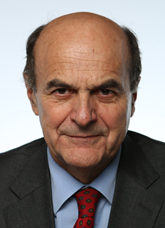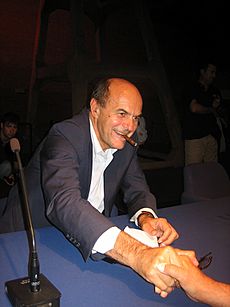Pier Luigi Bersani facts for kids
Quick facts for kids
Pier Luigi Bersani
|
|
|---|---|
 |
|
| Secretary of the Democratic Party | |
| In office 7 November 2009 – 20 April 2013 |
|
| Deputy | Enrico Letta |
| Preceded by | Dario Franceschini |
| Succeeded by | Guglielmo Epifani |
| Minister of Economic Development | |
| In office 17 May 2006 – 8 May 2008 |
|
| Prime Minister | Romano Prodi |
| Preceded by | Claudio Scajola (Productive Activities) |
| Succeeded by | Claudio Scajola |
| Minister of Transports and Navigation | |
| In office 22 December 1999 – 11 June 2001 |
|
| Prime Minister | Massimo D'Alema |
| Preceded by | Tiziano Treu |
| Succeeded by | Pietro Lunardi (Infrastructures and Transports) |
| Minister of Industry, Commerce and Craftmanship | |
| In office 18 May 1996 – 22 December 1999 |
|
| Prime Minister | Romano Prodi |
| Preceded by | Alberto Clò |
| Succeeded by | Enrico Letta |
| President of Emilia-Romagna | |
| In office 6 July 1993 – 17 May 1996 |
|
| Preceded by | Enrico Boselli |
| Succeeded by | Antonio La Forgia |
| Member of the Chamber of Deputies | |
| In office 28 April 2006 – 13 October 2022 |
|
| Constituency | Emilia-Romagna (2001–2013; 2018–2022) Lombardy (2013–2018) |
| In office 30 May 2001 – 19 July 2004 |
|
| Constituency | Emilia-Romagna |
| Member of the European Parliament | |
| In office 20 July 2004 – 27 April 2006 |
|
| Constituency | North-West Italy |
| Personal details | |
| Born | 29 September 1951 Bettola, Piacenza, Italy |
| Political party | PCI (before 1991) PDS (1991–1998) DS (1998–2007) PD (2007–2017; since 2023) Art1 (2017–2023) |
| Height | 1.8 m (5 ft 11 in) |
| Spouse | Daniela Ferrari |
| Children | 2 daughters |
| Alma mater | University of Bologna |
| Signature | |
Pier Luigi Bersani (born 29 September 1951) is an Italian politician. He was the leader, or Secretary, of the Democratic Party (PD). This was Italy's main centre-left political group from 2009 to 2013. Bersani has held many important government jobs. He was a Minister of Industry, Commerce and Craftmanship from 1996 to 1999. He also served as President of Emilia-Romagna, a region in Italy, from 1993 to 1996. Later, he was Minister of Transport from 1999 to 2001. From 2006 to 2008, he was the Minister of Economic Development.
Contents
Early Life and Education
Pier Luigi Bersani was born on September 29, 1951. His hometown is Bettola, a small mountain town in the province of Piacenza, Emilia-Romagna region, Italy. His father worked as a mechanic and at a gas station. After finishing high school in Piacenza, Bersani went to the University of Bologna. He studied philosophy and wrote his final paper about Pope Gregory I. In 1980, he married Daniela, and they have two daughters named Elisa and Margherita. After a short time as a teacher, he decided to focus on a career in politics and public service.
Political Journey
Starting in Politics
Bersani began his political journey by joining the Italian Communist Party. Later, he became a member of the Democratic Party of the Left. In this party, he was in charge of economic matters. When he was younger, he became the Vice-President of the Mountain Community of Piacenza. In 1990, he was elected to the Regional Council of Emilia-Romagna. He then became the Vice-President of Emilia-Romagna. From 1993 to 1996, he served as the President of this region.
Serving in Government (1996–2001)
After the general election in 1996, Bersani became a government minister. He was the Minister of Industry, Commerce and Craftmanship from 1996 to 1999. Then, he became the Minister of Transports from 1999 to 2001. He held these roles in governments led by prime ministers like Prodi, D'Alema, and Amato.
Time in the European Parliament (2004–2006)
In 2004, Bersani was elected to the European Parliament. This is a group of elected officials from countries in the European Union. He represented the North-West region of Italy. He was part of the Democrats of the Left party, which joined the Socialist Group. In the European Parliament, he worked on the European Parliament's Committee on Economic and Monetary Affairs. This committee deals with money and business rules. He also worked on relationships with countries like Kazakhstan and Uzbekistan. In 2006, he left the European Parliament. He was then elected to the Italian Chamber of Deputies and became the Minister of Economic Development.
Working for Economic Development (2006–2008)

As the Minister of Economic Development, Bersani worked to make the Italian market more open and competitive. He introduced new laws, often called "Bersani 1" and "Bersani 2." These laws aimed to help regular citizens by preventing big companies from having too much control. For example, they affected rules for taxi drivers and pharmacies. Bersani believed that opening up the market meant protecting people and making sure no single business became too powerful. His work also aimed to make it easier and faster for new businesses to start.
Leading the Democratic Party (2009–2013)
On October 25, 2009, Bersani won the election to become the Secretary of the Democratic Party. This made him the main leader of the opposition in Italy. He officially took office on November 7, 2009. In 2012, he won another important election within his party, defeating Matteo Renzi, who was the mayor of Florence at the time.
The 2013 Elections
Before the 2013 Italian general election, Bersani's Democratic Party was leading in the polls. However, support for his party dropped, while support for other parties grew. In the elections held on February 24–25, 2013, Bersani's centre-left group won a small majority in the lower house of parliament. This is called the Chamber of Deputies.
However, they did not win enough seats to have a majority in the Senate, which is the other part of the Italian parliament. In Italy, a government needs the support of both houses to stay in power. Bersani tried to form a government with the help of the Five Star Movement, a new political group. But he could not reach an agreement with them. On April 19, 2013, Bersani announced that he would step down as the leader of the Democratic Party. This happened after his party's candidate for president, Romano Prodi, also failed to get enough support in parliament.
Other Activities
In 2001, Bersani helped start a group called NENS. This group, whose name means "New Economy, New Society," is a "think tank." A think tank is a group that does research and suggests ideas on important topics. He also leads the Nuova Romea Society, which was created in 2002. This society works to help the regions of Emilia-Romagna and Veneto grow and develop.
Honors
- Légion d'honneur (a high award from France)
See also
 In Spanish: Pier Luigi Bersani para niños
In Spanish: Pier Luigi Bersani para niños
 | Jessica Watkins |
 | Robert Henry Lawrence Jr. |
 | Mae Jemison |
 | Sian Proctor |
 | Guion Bluford |

